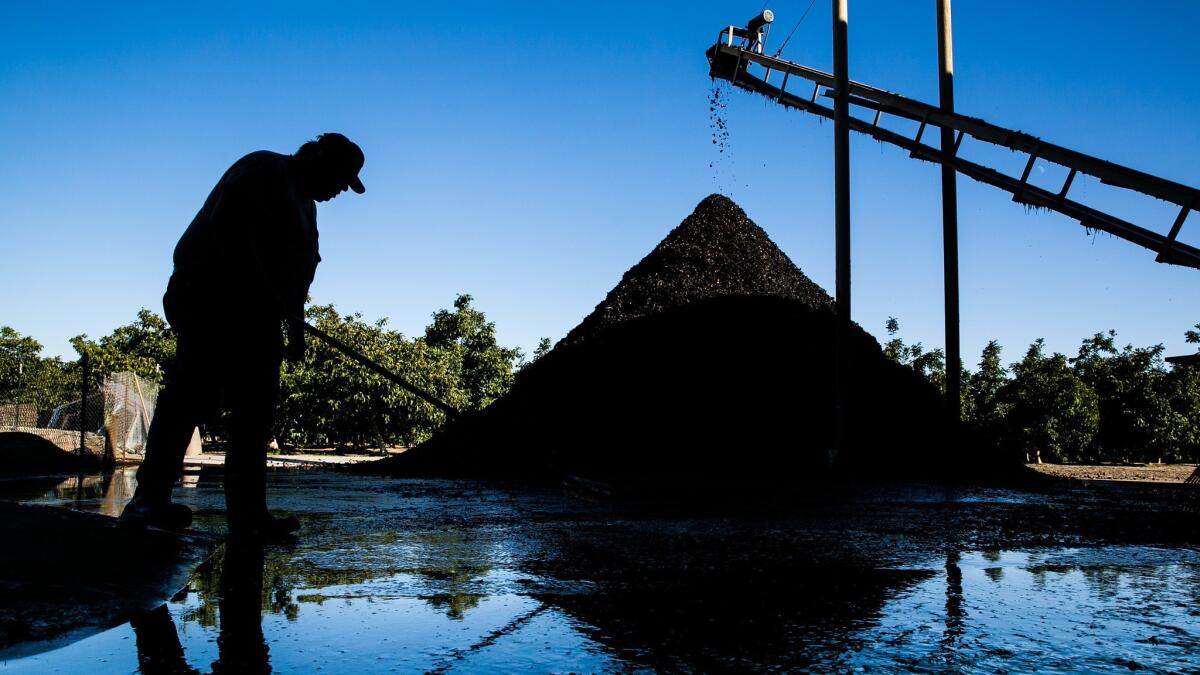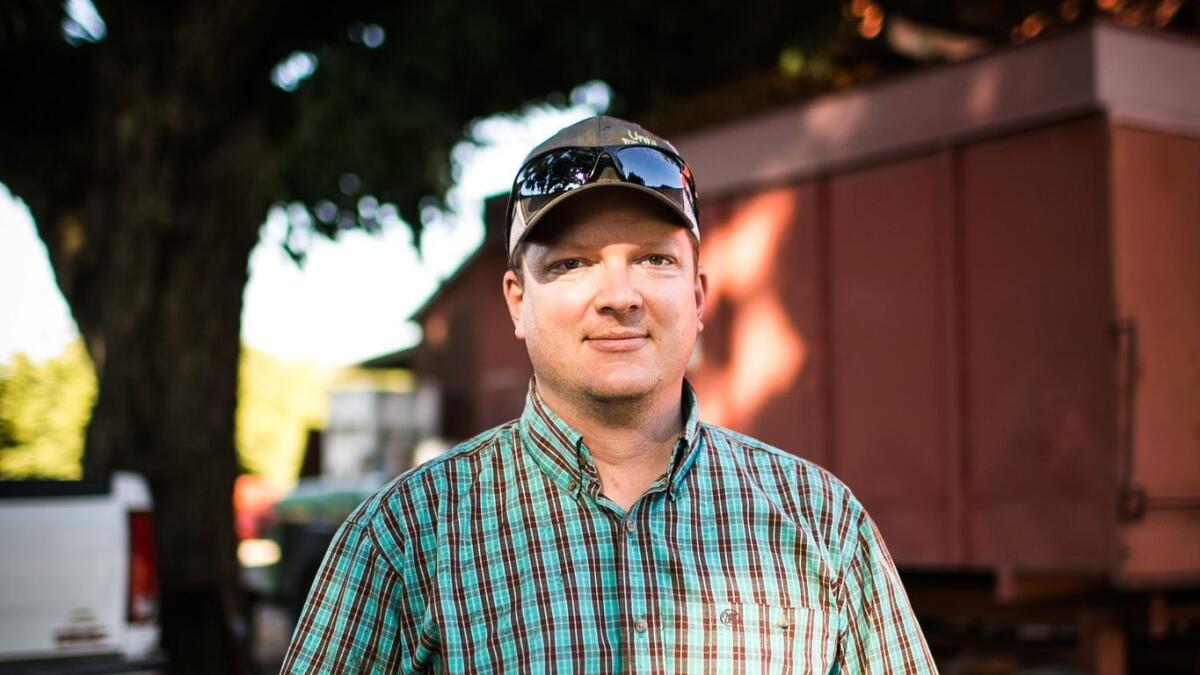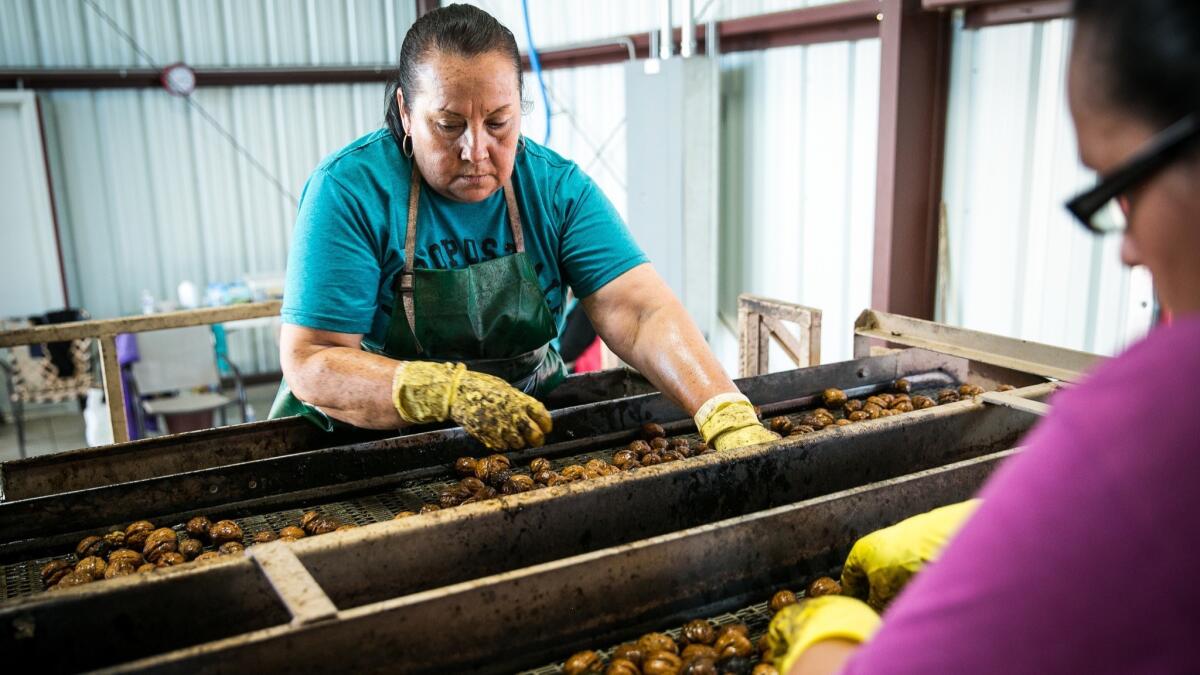In this California House race, water is ‘lifeblood.’ Will an edge on the issue give Republican Rep. Denham a boost?

- Share via
Reporting from Modesto — Jake Wenger grows walnuts on land where early settlers arrived in search of gold and instead found rich soil. His orchards just west of Modesto stretch 700 acres and supply a nut company that has remained in his family for four generations.
Like other farmers in this congressional district at the northern end of the San Joaquin Valley, Wenger, 34, said he fears his livelihood is under siege by a state plan to reduce the waters diverted from Northern California rivers for irrigation.
He and other farmers agree that water is the region’s lifeblood and that there isn’t enough of it. But as the race between Republican Rep. Jeff Denham of Turlock and Democrat Josh Harder near its conclusion, the farmers are mixed on who will do a better job of fighting for greater access to the scarce resource. Polls show the candidates in a virtual tie in one of the most heated races in California.
“There are a lot of key issues here,” Wenger said as he hulled walnuts on a brisk October day, his hands stained with the black ink of crushed husks. “But without water, what else do we have?”

The issue could serve as a boost for Denham, who has the firm support of local farm bureaus and, like other Republican members of Congress in the Central Valley, has long made farmers’ calls for water a political rallying cry.
The three-term incumbent sought to underscore the advantage when he was one of five California GOP congressmen — House Majority Leader Kevin McCarthy and Reps. David Valadao, Devin Nunes and Tom McClintock were the others — to stand by President Trump last week as he signed a presidential memo directing federal agencies to speed up their biological reviews of water projects in California.
Policy experts doubted the directive would have little immediate effect, saying it illustrated how little power the federal government has to unilaterally send more water to Valley growers.
Some farmers say they want a fresh approach and are lining up behind first-time candidate Harder, 32. The investor and former venture capitalist also has ties to the farming community: His great-great-grandfather was a peach grower in Manteca.
Bob Cushing, an almond grower who has been farming east of Oakdale for 20 years, admires Harder’s credentials and thought he would do his research to help farmers and the environment.
“Denham has had eight years to work on these issues,” Cushing said. “It is time for change.”
Millions of dollars are pouring into the race for the 10th Congressional District. It’s one of seven California districts long held by Republicans and heavily targeted by national Democrats in this midterm election. The district spans miles of orchards and ranches across Stanislaus County and the southern portion of San Joaquin County.
Democrats here hold a slight voter-registration edge and carried the last two presidential elections. Latinos — who lean Democratic — make up more than 40% of the population, but their low voter turnout has helped keep the congressional seat in Republican hands.
Water here is an issue that cuts across demographics, ideologies and party lines in an area where agriculture is one of the area’s top economic drivers. Along roadways and chain-link fences, farmers vent their frustrations on placards that hang alongside campaign signs, declaring, “Water for food is not a waste.”
Across the Central Valley, politicians — Republican and Democrat — tend to see themselves in a perpetual struggle with environmentalists in coastal cities and with farmers in other parts of the state to protect an irrigation network they say helps produce more than half the state’s fruits, nuts and vegetables.
Bringing water to the Valley “is one of the few issues where you have a bipartisan agreement,” said Brian Gray, a senior fellow at the Water Policy Center under the Public Policy Institute of California.
This year, water has come to the forefront of voters’ minds as the California Water Resources Control Board weighs its plan to allow more water from three rivers to flow freely to the Pacific Ocean, reducing the amount farmers can use for irrigation. Scientists say the move will help replenish the Delta and aid fish and fisheries. The plan has been denounced by many, if not most farmers, who say it will cause them to fallow fields and lay off workers, devastating the region’s economy.
Both Denham and Harder have seized on the water concerns. They oppose the state water board’s plan, and another proposal from Gov. Jerry Brown for a $17-billion twin-tunnels project in the Sacramento-San Joaquin Delta meant to send more water to Southern California.

When more than 1,500 protesters and lawmakers from the region descended upon Sacramento over the water board’s plan, Denham spoke to the crowd. He later attacked Harder, whom he has sought to cast as a “Bay Area” candidate who doesn’t understand the region’s water plight.
“Josh Harder’s failure to attend and fight the state water grab or meet with local ag leaders shows he’s not fit to represent the Central Valley,” he said after the Capitol protest.
Denham, 51, first made his name as a vocal advocate for farmers as a state senator fighting for a bond to increase water storage. It wouldn’t pass until 2014, after he left for Congress. But former state Assemblywoman Kristin Olsen, now a Stanislaus County board supervisor, said it was state leaders such as him who laid the groundwork.
“What I admire about Jeff is he is persistent,” she said.
The congressman now counts wealthy Democratic farmers among his political donors, and farmers credit him with helping secure funding to raise the Shasta Dam and maintain a wastewater treatment plant. He also helped pass legislation with Rep. Jim Costa (D-Fresno) and Sen. Dianne Feinstein (D-Calif.) to increase the amount of federal dollars to water projects in the Central Valley and across the western United States.
Harder, who was born and raised in the district, has fired back at Denham, pointing out the district hasn’t seen any federal dollars spent on water projects during the congressman’s time in office. “Washington insiders like Jeff Denham have done nothing to actually ensure our access to our water,” Harder wrote in a Modesto Bee op-ed opposing the state water plan.
Outside Modesto, at the Wood Colony Nut Co., which Wenger runs with his father out of a bright, red barn, the farmer said he has supported both Democrats and Republicans in the Valley’s fight for more water. But he said Denham had the experience and clout to influence state and federal officials.
Wenger was on the Modesto Irrigation District’s board of directors when he made several trips to Washington to persuade members of Congress to fight the state board plan.
“Every time we would get the same response,” Wenger recalled of his conversations with members of Congress. “‘That is a state issue — sorry, I can’t help you.’”
It has been Denham, he said, who in recent weeks has helped bring Interior Secretary Ryan Zinke, Agriculture Secretary Sonny Perdue and acting Environmental Protection Agency Administrator Andrew Wheeler to survey the potential damage. Zinke later wrote a memo to his staff asking them for a plan to circumvent California’s state water policy.
“Jeff was the only one who said, let’s think about how we can do this,” Wenger said.
But to John Casazza, it’s all political show. He grows walnuts, almonds and peaches in the small farming community of Hughson, just east of Modesto, where farmers have been hurt hard during the drought.
“He is just parading these guys around,” the 75-year-old farmer said of Denham. What the district needs, he argued, is someone who can bring local, state and federal officials together, something he said Denham hasn’t been able to do.
“He hasn’t won a single fight against environmentalists who fight us tooth and nail on the need to build a dam,” said Casazza, who has appeared in television ads for Harder.
Stephen Routh, a political science professor at Cal State Stanislaus, said Trump’s latest water memos reinforced the optics that Denham could bring in federal policy that can assist local farmers, though they were likely “to attract lawsuits galore” and not have long-term impact.
Still, in an area where partisan rifts reflect the country’s divide, a trending blue wave could tilt the odds in Harder’s favor. “It is going to be a nail-biter race until the end,” Routh said.
More stories from Jazmine Ulloa »
More to Read
Get the L.A. Times Politics newsletter
Deeply reported insights into legislation, politics and policy from Sacramento, Washington and beyond. In your inbox twice per week.
You may occasionally receive promotional content from the Los Angeles Times.











